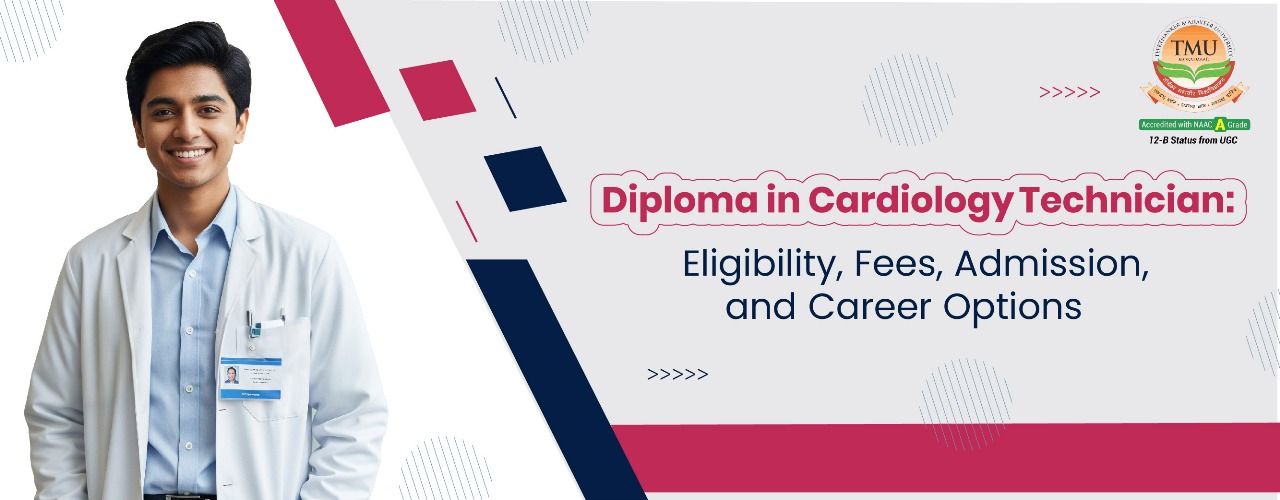Diploma in Cardiology Technician: Eligibility, Fees, Admission, and Career Options
Table of Contents
If you are interested in how the human heart works, a Diploma in Cardiology Technician is a quick and practical way to enter the medical field. This course teaches you how to use heart-monitoring machines like ECG and TMT. You will work closely with heart specialists (Cardiologists) to help diagnose heart problems. It is a vital role because your work helps doctors make life-saving decisions for patients with heart conditions.
What is a Diploma in Cardiology Technician?
A Diploma in Cardiology Technician is a short-term medical course designed to train students in performing diagnostic tests and assisting doctors in the treatment of heart diseases. The course usually lasts for 2 years, though in some institutions it may be completed in 1 year with internships.
During the Diploma in Cardiology Technician course, students learn how to operate machines like the Electrocardiogram (ECG), echocardiography (Echo), and treadmill test (TMT) machines, which help in detecting heart problems. In addition, apart from technical training, the course also focuses on teaching students how to handle patients, record medical histories, and assist doctors during cardiac procedures.
A cardiology technician acts as a support system for cardiologists. For example, when a patient comes with chest pain, the technician is the first to conduct tests like an ECG and prepare reports that help the doctor diagnose the problem. This makes them an essential part of the healthcare team.
Teerthanker Mahaveer University
Apply for Admission
Click Here To Apply for Admission
Diploma in Cardiology Technician programme:
| Aspect | Details |
| Course Name | Diploma in Cardiology Technician (DCT) |
| Course Level | Diploma (Paramedical) |
| Duration | 1–2 years (varies by institute) |
| Eligibility | 10+2 (Science stream with Physics, Chemistry, and Biology) |
| Minimum Marks Required | 45–50% in 12th standard (relaxation for reserved categories) |
| Age Limit | Minimum 17 years (upper age limit depends on the institution) |
| Admission Process | Merit-based / Entrance exam-based (varies by college) |
| Average Course Fees | ₹50,000 – ₹2,00,000 (depending on college type) |
| Subjects Covered | Anatomy & Physiology, ECG Technology, Echocardiography, TMT, Pathology, Pharmacology, Cardiac Care |
| Training | Practical lab sessions + Hospital/Diagnostic center internship |
| Key Skills Gained | ECG & Echo operation, patient care, cardiac emergency handling, teamwork |
| Job Roles | ECG Technician, Cardiology Lab Assistant, Stress Test Technician, Holter Technician |
| Employment Areas | Hospitals, Clinics, Diagnostic centers, Rehabilitation centers, Corporate health units |
| Starting Salary (India) | ₹15,000 – ₹25,000 per month |
| Abroad Opportunities | High demand in USA, UK, Canada, UAE with better pay packages |
| Higher Studies Options | B.Sc. Cardiac Care Technology, B.Sc. Medical Lab Technology, M.Sc. in Cardiac Technology, Advanced Certifications |
Eligibility Criteria for Diploma in Cardiology Technician
Before applying for the Diploma in Cardiology Technician course, students must meet certain requirements. The eligibility criteria may vary slightly from one college to another, but the common requirements include:
- Educational Qualification: Students must have completed 10+2 (Class 12) with Physics, Chemistry, and Biology (PCB) as compulsory subjects. Some institutions also accept students from the science stream without biology, but preference is given to PCB students.
- Minimum Marks: Most colleges require at least 50% marks in 12th grade. Reserved category students (SC/ST/OBC) may get relaxation as per government norms.
- Age Limit: The minimum age is usually 17 years, and there is no strict upper age limit in many institutes. However, some colleges may have an age cap of 30 years.
- Skills Required: Apart from educational qualifications, students must have certain skills, such as:
- Good communication and patient-handling ability
- Attention to detail
- Quick decision-making in emergencies
- Basic knowledge of computers and medical equipment
Meeting these requirements ensures that students are well-prepared for the challenges of the course and their future careers.
Admission Process
Getting admission into a Diploma in Cardiology Technician course is generally simple, but the process can differ depending on the institute. There are mainly two ways to get admitted:
- Merit-Based Admission: Many government and private colleges admit students based on their 12th-grade marks. A merit list is prepared, and candidates are selected according to their scores.
- Entrance Exam-Based Admission: Some reputed institutions conduct their own entrance exams to test the student’s knowledge in subjects like Physics, Chemistry, and Biology. Clearing the exam secures a seat in the course.
- Documents Required for Admission: At the time of admission, students usually need to submit:
- 10th and 12th mark sheets.
- Transfer certificate
- Caste certificate (if applicable)
- ID proof (Aadhaar, voter ID, etc.)
- Passport-size photographs
The admission season generally starts after the 12th board results are announced, and students are advised to apply early to secure their seats.
Course Fees and Financial Support
The cost of the Diploma in Cardiology Technician course depends on whether you join a government or private institution. On average, the fees range from ₹50,000 to ₹200,000 for the entire course.
- Government Colleges: Government institutions usually charge lower fees, ranging from ₹15,000 to ₹50,000 per year, making them affordable for many students.
- Private Colleges: Private institutions may charge higher, around ₹80,000 to ₹1,50,000 per year, depending on the facilities and reputation of the college.
- Additional Costs: Apart from tuition fees, students may also have to pay for books, laboratory charges, uniforms, and training programmes.
- Scholarships and Financial Aid: Many state governments and private institutions offer scholarships to meritorious students or those belonging to economically weaker sections. Banks also provide education loans to cover the cost of the course.
This makes the diploma an affordable option compared to long medical degrees, while still offering good career opportunities.
Syllabus and Subjects Covered
The Diploma in Cardiology Technician is designed to give students both theoretical knowledge and practical training. The curriculum focuses on preparing students to handle different aspects of cardiac testing and patient care.
Some of the major subjects covered include:
- Anatomy and Physiology of the Heart: Students learn about the structure and functioning of the human heart, blood circulation, and related organs. This forms the foundation for understanding cardiac disorders.
- Electrocardiography (ECG) Technology: Training in using ECG machines, interpreting wave patterns, and identifying abnormalities.
- Echocardiography and Doppler Studies: Basics of ultrasound technology and how it is applied to study heart valves and chambers.
- Treadmill Test (TMT): Conducting stress tests to check how the heart performs under physical activity.
- Clinical Pathology and Biochemistry: Understanding lab investigations related to cardiac health.
- Pharmacology Basics: Knowledge of medicines commonly used in treating heart patients.
- Emergency Cardiac Care: Training in handling emergencies like cardiac arrest, chest pain, and arrhythmias.
Apart from classroom learning, students undergo internships in hospitals and diagnostic centres, where they gain real-world exposure.
Practical training is the most important part of the Diploma in Cardiology Technician course, as it builds confidence and prepares students to handle patients independently.
Skills You Gain During the Course
Pursuing a diploma in cardiology technician is not just about learning subjects—it is about developing practical and professional skills that make you job-ready.
Some key skills include:
- Technical Skills
- Operating ECG, Echo, Holter monitoring, and TMT machines
- Preparing patients for cardiac tests
- Recording and maintaining accurate patient data
- Patient Care Skills
- Communicating with patients and explaining procedures
- Providing emotional support during stressful tests
- Maintaining a calm approach during emergencies
- Emergency Response Skills
- Assisting in critical situations like heart attacks
- Performing basic life support (BLS) techniques
- Supporting doctors during cardiac procedures
- Soft Skills
- Teamwork and coordination with doctors, nurses, and other staff
- Time management in handling multiple patients
- Ethical behaviour and patient confidentiality.
By the end of the course, students are trained technicians and have developed a professional attitude that helps them thrive in the medical field.
Career Options After a Diploma in Cardiology Technician
The healthcare sector is one of the fastest-growing industries, and with an increase in heart-related problems, the demand for cardiology technicians is also rising. After completing the diploma, students can explore several career paths:
- Hospitals and Clinics
Most graduates work in private or government hospitals, supporting cardiologists in diagnosing and treating patients. - Diagnostic Centers
Standalone diagnostic labs and centres hire technicians for conducting ECGs, Echo tests, and other cardiac investigations. - Nursing Homes and Rehabilitation Centres
These facilities require technicians to monitor heart patients regularly. - Private Practice
Experienced technicians may open their own diagnostic setups with proper certifications. - Corporate Health Centres
Many large companies employ healthcare staff, including cardiology technicians, for employee health checkups.
This wide range of opportunities makes the diploma an excellent choice for those who want a stable and respected career in healthcare.
Job Roles and Responsibilities
Once you complete the diploma, you can work under different job titles, each with specific responsibilities:
- ECG Technician: Responsible for performing electrocardiograms, monitoring results, and identifying irregularities.
- Cardiology Lab Assistant: Assists doctors in labs by preparing equipment, managing patient reports, and ensuring smooth operations.
- Stress Test Technician: Conducts treadmill tests (TMT) and monitors patient response during exercise.
- Holter Monitoring Technician: Specialises in attaching portable devices that record heart activity for 24–48 hours.
- Assistant in Cardiac Procedures: Works alongside doctors during procedures like angiography, angioplasty, and pacemaker implantation.
Each role requires dedication, attention to detail, and the ability to remain calm while working in critical environments. Over time, technicians can move into supervisory or teaching positions with more experience.
Salary and Growth Opportunities
The salary of a cardiology technician depends on factors such as location, type of hospital, and experience. On average:
- Freshers can expect a starting salary of ₹15,000–₹25,000 per month in India.
- With 2–5 years of experience, salaries may rise to ₹30,000–₹40,000 per month.
- In private hospitals and diagnostic centers, experienced technicians can earn ₹4–6 lakh per year.
- Abroad, salaries are much higher, especially in countries like the UAE, UK, and USA, where technicians are in high demand.
Apart from salary, career growth opportunities are also promising. For instance, with additional training and certifications, technicians can become senior cardiac technologists or lab managers. Moreover, they can pursue higher education in healthcare management or cardiac technology. Consequently, the profession offers both financial rewards and long-term career advancement.
Higher Studies After Diploma
A diploma is often just the first step in building a strong career in cardiology technology. Moreover, many students choose to continue their studies after completing their diploma to improve their job prospects and earning potential. For example, some of the most popular options include:
- Bachelor’s Degree Programs: Students can pursue a B.Sc. in Cardiac Care Technology or B.Sc. in Medical Lab Technology, which provide more in-depth training and advanced career opportunities.
- Postgraduate Diplomas and Certifications:Specialized courses like Diploma in Echocardiography, Diploma in Critical Care, or Advanced Cardiac Life Support (ACLS) certifications can give you an edge in the job market.
- Master’s Degree Options: After a bachelor’s degree, students may go for an M.Sc. in Cardiac Technology or related fields to qualify for higher positions in hospitals, research, or teaching.
- International Certifications: Numerous international healthcare organisations provide globally recognised certifications. For instance, certifications in ECG technology, stress testing, or cardiac sonography can open up opportunities abroad.
Pursuing higher studies not only enhances knowledge but also ensures better career growth and stability in a competitive healthcare field.
Tips for Building a Successful Career
Starting a career as a cardiology technician is just the beginning. To grow in this field, you need more than just technical knowledge. Here are some useful tips:
- Focus on Internships: Practical training during internships is more valuable than classroom learning. It exposes you to real-life cases and builds confidence.
- Improve Communication Skills: Technicians interact with patients daily, many of whom may be anxious. Being calm and empathetic helps build trust.
- Stay Updated with Technology: Medical equipment is constantly improving. Attend workshops and training programs to stay ahead.
- Network with Professionals: Building connections with doctors, senior technicians, and hospital staff can help you find better job opportunities.
- Consider Higher Education: Pursuing advanced studies or certifications can push you toward leadership roles in the medical field.
- Maintain Professional Ethics: Confidentiality, discipline, and empathy are crucial in healthcare. These qualities enhance your reputation as a reliable professional.
By combining skills, education, and professionalism, you can build a long-lasting and fulfilling career in cardiology technology.
Future Scope of Cardiology Technicians in India and Abroad
The scope of this career is expanding rapidly, both in India and internationally.
- In India: Heart-related issues are on the rise due to lifestyle factors such as stress, poor diet, and lack of exercise. Consequently, the demand for cardiology technicians will continue to grow. Moreover, government hospitals, private healthcare chains, and diagnostic labs are constantly hiring skilled professionals.
- Abroad: Developed countries like the USA, UK, Canada, and Gulf nations have an even higher demand for cardiac care professionals. With international certifications, Indian students can secure high-paying jobs abroad.
- Impact of Technology: New technologies such as AI-based diagnostics, portable ECG devices, and advanced imaging systems are revolutionising cardiology. Technicians who stay updated with these innovations will have better job opportunities in the future.
Overall, the career has strong long-term prospects, making it a smart choice for students who want stability and growth in the healthcare sector.
Why Choose TMU for a Diploma in Cardiology Technician?
Teerthankar Mahaveer University (TMU) is a great choice for a Diploma in Cardiology Technician because it provides high-quality education with modern labs and practical training. TMU has experienced faculty who guide students in learning advanced heart care techniques. Moreover, the university focuses on skill development, hands-on practice, and industry exposure, thereby helping students get ready for real-world jobs in hospitals and clinics. As a result, with TMU, students not only gain knowledge but also build a strong career foundation in cardiology. Here are some reasons why you should choose TMU:
- Excellence Academic Foundation: Teerthankar Mahaveer University provides strong academic excellence for students. Here, students can get knowledge of both practical and basic. Students get hands-on experience in labs and hospitals, which prepares them for real-world challenges.
- Career Opportunities: TMU provide a range of career opportunities for aspirants. Completing a diploma at TMU opens the door to jobs in hospitals, clinics, and diagnostic centres. Here, students can also get a guide related to their future career.
- Experienced Faculty: The faculty of TMU includes experienced doctors and healthcare professionals who guide students throughout their learning journey. Their expertise ensures that students understand both the theory and practical aspects of cardiology care.
- Supportive Learning Environment: TMU emphasises a student-friendly environment with mentoring, counselling, and regular skill-building workshops. This support helps students gain confidence and achieve success in their chosen field.
Conclusion
A Diploma in Cardiology Technician is a great career path for students who want to enter the medical field quickly and at a low cost. In fact, with just 1–2 years of study, you can start working in hospitals, clinics, and diagnostic centres, where you will assist doctors in checking and helping heart patients. Additionally, the rules are simple, the fees are affordable, and the career opportunities are many.
However, the job does come with problems such as stress and long hours. Nevertheless, the satisfaction of saving lives and helping healthcare makes it highly satisfying. Also, with higher studies and certifications, you can continue to grow in your career and even find jobs abroad.
Therefore, if you are passionate about healthcare and want a steady job with a good purpose, choosing a Diploma in Cardiology Technician is a smart choice. Ultimately, it offers both personal satisfaction and career growth.
FAQs
Q1: What is the scope of the Diploma in Cardiology Technician?
Ans: The scope is very promising, not only in India but also abroad. For instance, graduates can work in hospitals, cardiac clinics, diagnostic centres, rehabilitation centres, and research institutes. Specifically, job roles include ECG Technician, Echocardiography Technician, TMT Technician, Cath Lab Assistant, and Cardiac Monitor Technician.
Q2: Who can do a Diploma in Cardiology Technician?
Ans: This Diploma in Cardiology Technician course is suitable for students who have completed 10+2 in Science (Physics, Chemistry, Biology). Moreover, individuals who are interested in healthcare, medical technology, and patient care, and are willing to work in hospitals or diagnostic centres, are ideal candidates. Additionally, some institutes may also consider candidates with a science background, including Mathematics in place of Biology.
Q3: What is the qualification of a Cardiac Technician?
Ans: A Cardiac Technician typically holds a Diploma in Cardiology Technology/Technician from a recognised institute. They are trained to operate diagnostic equipment like ECG machines, echocardiography devices, treadmill stress test systems, and Holter monitors, and assist cardiologists in patient care. Higher qualifications or specialisation, such as a B.Sc. in Cardiac Care Technology, can lead to advanced roles or senior positions.
Q4: How long does the Diploma in Cardiology Technician take?
Ans: The Diploma in Cardiology Technician typically takes 1–2 years, depending on the institute. Furthermore, the programme combines theoretical knowledge, practical laboratory sessions, and hospital internships, thereby ensuring that students gain real-world experience in cardiac care.
Q5: Can I work abroad after completing this diploma?
Ans: Yes, graduates can explore opportunities in countries like the USA, UK, Australia, Canada, and Middle East nations. However, working abroad may require additional certifications, licensing, or recognition of your qualification in the target country.
This content gives an overview of the programme and is for educational purposes only. For updated admission guidelines and counselling support, please connect with our Counsellor Team.














